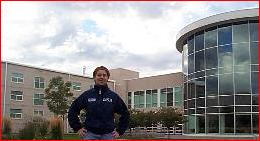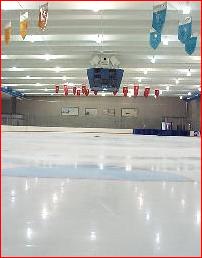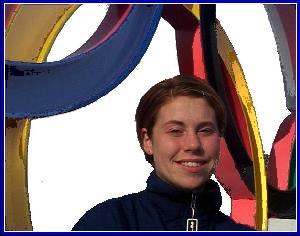 Friday, September 10, 1999, Colorado Springs, Colorado -
We live our lives not only for the perfect, sunny days, but also for the exciting and dramatic moments that challenge us and reward us. Julie Goskowicz is a speed skater on the U.S. Olympic team, and she trains each day so that when she represents our country in the 2002 Olympic games - an athlete's ultimate challenge - she will have what it takes to be the best in the world.
Friday, September 10, 1999, Colorado Springs, Colorado -
We live our lives not only for the perfect, sunny days, but also for the exciting and dramatic moments that challenge us and reward us. Julie Goskowicz is a speed skater on the U.S. Olympic team, and she trains each day so that when she represents our country in the 2002 Olympic games - an athlete's ultimate challenge - she will have what it takes to be the best in the world.
Nineteen-year old Goskowicz grew up in New Berlin, Wisconsin, and she knows how to skate. Lace a pair of seventeen-inch racing blades on her feet and she will fly past you at better than thirty miles an hour. She is a short-track speed skater - let's get that straight. She can't "beat" Bonnie Blair or Eric Heiden because she doesn't play their game, which is long-track. Blair and Heiden skate on their own, without competition - as Goskowicz says; "it's just you against the track."
 They focus on one thing; pushing harder and harder, and their goal is way down at the end of the ice. But in short-track, you compete head-to-head with up to seven other skaters. It's a true race, a fight for the finish - hell, compared to long-track, it's a rumble. There's a whole lot of strategy involved; in outpacing, outmaneuvering and outwitting your competition. But best of all, your goal is right next to you, and you can either get past it or you can lose. You're thinking during every second of that race. You're thinking, and plotting, and struggling, and fighting and digging in harder and harder, because you've got winning on your nose and losing on your tail, and every step you take, every turn you make, may wreck you unless you push past it.
They focus on one thing; pushing harder and harder, and their goal is way down at the end of the ice. But in short-track, you compete head-to-head with up to seven other skaters. It's a true race, a fight for the finish - hell, compared to long-track, it's a rumble. There's a whole lot of strategy involved; in outpacing, outmaneuvering and outwitting your competition. But best of all, your goal is right next to you, and you can either get past it or you can lose. You're thinking during every second of that race. You're thinking, and plotting, and struggling, and fighting and digging in harder and harder, because you've got winning on your nose and losing on your tail, and every step you take, every turn you make, may wreck you unless you push past it.
"Sometimes, you could be the fastest skater in the world, but you could get stuck, or get a bad start, or trip up, and you've lost your medal right there," Goskowicz says. "There are so many instances where it's not the fastest skater that won, it's the smartest one - or the luckiest one."
 Skaters can not actively block others from passing them - that's for roller derby - but they don't exactly have to move out of the way. Short track speed skaters study each others' styles, and they strategize against them. For example; if you can skate strong in a longer race, such as the 1,000 meter, you should start out faster, to tire out your opponent. Or; "If your opponent is a tough one to pass," Goskowicz says. "Then "you'll want to be in front of them before the pace picks up."
Skaters can not actively block others from passing them - that's for roller derby - but they don't exactly have to move out of the way. Short track speed skaters study each others' styles, and they strategize against them. For example; if you can skate strong in a longer race, such as the 1,000 meter, you should start out faster, to tire out your opponent. Or; "If your opponent is a tough one to pass," Goskowicz says. "Then "you'll want to be in front of them before the pace picks up."
|
Is it worth the years of hard work for 3 weeks of competitions? "It is - it is so worth it!" |
Julie Goskowicz would not be an Olympian without the help of her father, an amateur skater. Though her parents divorced when she was a child, he brought her and her brother to the ice often, and he volunteers at competitions. "I still think he knows me better than any coach will ever know me," Goskowicz says. She began at age seven, and quickly made up her mind to skate in the Olympics. In 1994, she had the motivation of her brother making the U.S. team. "I saw him come out in the opening ceremonies and I just started crying," she says. "I said; 'I'm going there!'"
One of the finer moments in the life of Julie Goskowicz was the day she made the U.S. Olympic team. Two weeks before the 1998 winter games, she entered six qualifying races. It came down to the final day of trials, and the final race. "It was a big, mental game, for me," she says. The next few minutes would be the proving ground for over a decade of training, and if she missed this chance, she would have to wait four more agonizing years for another one. Goskowicz didn't win the race that day, but she did well enough to make the team. At 17 years old, she was one of the youngest women on the team, and she went to Japan as an alternate for the relay. The team didn't win a medal, but that nearly didn't matter to her, for she was an Olympian, and that is something no one can ever take away from her - no one, except her fellow students, that is. "I remember high school gym class after I returned from Japan," she says. "I'm not so good at basketball. I felt kind of, like, 'OK, I'm an Olympian and I can't even dribble the ball right!'" Some students - usually the guys - teased her, but then, that's high school.
 One of the darkest moments in her life came last year, when, during a practice, she took a violent spill. It was a frightening moment, as she watched years of work and dedication crash into the boards with her, and it was a surreal drama, as they slid a backboard beneath her, and carried her off the ice. The X-rays were gloomy, revealing a fractured spine.
One of the darkest moments in her life came last year, when, during a practice, she took a violent spill. It was a frightening moment, as she watched years of work and dedication crash into the boards with her, and it was a surreal drama, as they slid a backboard beneath her, and carried her off the ice. The X-rays were gloomy, revealing a fractured spine.
The spine could heal, but the doctors said it would take at least two months, which was far too long, as she had a very important race in only six weeks; the Jr. World Speed Skating competition would be her last chance to make that team. To get there, she also had to leap the psychological hurdle. "For a while, I was scared to go out on the ice again," she says. But out on the ice she did go, in less than one month, and she trained hard for the next two weeks. Half the battle was mental; overcoming the fear of crashing again, imagining herself healing and getting on the ice, and imagining herself winning.
She did more than just imagine, as she got into the world competition, with formidable opponents. "All those girls were so much stronger than me," she says. "But, I just went out there and said; 'I'm gonna make this team,' and I believed in it and I made it." She finished second overall, which was more than enough to put her on the Junior World Champion Speed Skating Team. "That was the biggest learning experience for me ever," she says. "To injure myself like that, and to come back. You really learn how much you love your sport, and you really learn what you're capable of doing - if I can do that, it seems like I can do anything."
 Want to train like an Olympic athlete?
Want to train like an Olympic athlete?
6:00 a.m. - Rise, dress, grab a bite, get to the rink.
6:45 a.m. - Warm up, put out mats.
7:30 - 9:30 a.m. Practice. Skate like hell for two hours.
10:00 a.m. Breakfast.
10:30 - 1:00 p.m. Shower, change. Sharpen skates.
1:00 p.m. Lunch.
1:40 - 2:55 p.m. Class at U.C.
3:00 p.m. - Change clothes.
3:15 - 5:15 p.m. Workout. (Hill run, velodrome, weight training, plyometrics.)
5:30 p.m. - Shower, change.
6:00 p.m. - Dinner.
7:00 - 9:15 p.m. - Class at U.C.
10:00 p.m. - Bed.
This is Goskowicz's Tuesday schedule. She averages three classes each week. With no upcoming races, weekends are free from practices, so she fills this with a part-time job. Train hard for 11 months each year and you get April off.
|
 There is a lot of money in sports, and even in the Olympic games. When Goskowicz qualified for the U.S. Olympic team, she earned several benefits. She gets a room in the two-year old, $11.8-million athlete center of the U.S. Olympic Complex, in Colorado Springs. She gets three meals a day, and also room, board and transportation during competitions. She has a nutritionist, sports psychologist and doctor, and she participates in physical testing and research. She is provided with skates and other gear. Generally, she is given whatever it takes for her to be the best skater possible.
There is a lot of money in sports, and even in the Olympic games. When Goskowicz qualified for the U.S. Olympic team, she earned several benefits. She gets a room in the two-year old, $11.8-million athlete center of the U.S. Olympic Complex, in Colorado Springs. She gets three meals a day, and also room, board and transportation during competitions. She has a nutritionist, sports psychologist and doctor, and she participates in physical testing and research. She is provided with skates and other gear. Generally, she is given whatever it takes for her to be the best skater possible.
Since she is in the top six on the Olympic team, Goskowicz qualifies for educational grants from the USOC, so she can work on her bachelor's degree in business marketing at the University of Colorado. Various organizations help make this possible, including the team's sponsor; Ameritech. After all, in two years, she will be an ambassador for our nation in the most widely watched sporting event in the world. She will compete with "USA" on her back, and she will race against the fastest and toughest skaters in the world, and we want her to skate faster than them, to be the very first to cross the line, and to take a gold medal home.
 U.S. Olympic speed skating Coach Susan Ellis (right) fine tunes strategy for team members during a break in practice.
U.S. Olympic speed skating Coach Susan Ellis (right) fine tunes strategy for team members during a break in practice.
|
But, even with all this fanfare, Goskowicz is no princess, and she keeps a part time job at a local sandwich shop to raise a few hundred dollars each month. So, the angry customer who stormed out of Blimpy's sandwich shop, after cursing out the petite, pleasant countergirl because, oh, the place is out of barbecue chips, or something, most likely had no idea he was berating an international ambassador. "I just blow it off," she says. "When I'm working there, I'm just, like; 'All I have to do is make this sandwich, and be nice to these people, and if they're not gonna be nice, then they'll be gone in a couple of minutes anyway..." In a few years, that man will be sitting on his couch, watching ESPN, and maybe he'll see a familiar face, and maybe he'll even drop his sandwich, and that would seem pretty fair.
Goskowicz has been training and skating for so long, she hardly knows what a "normal" life is. "Sometimes I wondered if all those years of training were worth it," she says. "But when I walked into that stadium for the opening ceremonies, and all those people were there, cheering for me - that's when I knew it was worth it." Goskowicz is referring to the 1998 games, held in Japan, and she is more than ready to compete in in Salt Lake City, Utah, in 2002. "When you're in a world championships in a foreign country, everyone's supporting that country's team," she says. "But when you have a world championships in the U.S., you get all the support. It's just so much more fun, and it helps a lot."
The way it helps, is a phenomenon which no athlete can deny; that having people support you while you compete, can boost your performance. It's the best drug going, and one of the few legal ones in these games. Hearing the crowd as you round that last turn can nearly push you right to the finish line.
 What's next? Goskowicz doesn't know for sure, but off the ice, she will work toward her bachelor's degree, and then, hopefully a masters from Northwestern College. On the ice, she'll keep racing for the U.S. as long as she can, avoiding other, dangerous sports, to protect herself. "I'm trying to commit myself 100% to skating now," she says. "When I'm done, I'll do all the crazy stuff that I want to do." She doubts that she will ever fully retire her skates. "It's an addiction - once you're in it, it's so hard to get out, and I think I will always want to be involved in speed skating in some way or another."
What's next? Goskowicz doesn't know for sure, but off the ice, she will work toward her bachelor's degree, and then, hopefully a masters from Northwestern College. On the ice, she'll keep racing for the U.S. as long as she can, avoiding other, dangerous sports, to protect herself. "I'm trying to commit myself 100% to skating now," she says. "When I'm done, I'll do all the crazy stuff that I want to do." She doubts that she will ever fully retire her skates. "It's an addiction - once you're in it, it's so hard to get out, and I think I will always want to be involved in speed skating in some way or another."
When you're in a large arena, and the crowd starts to applaud, it can sound like rain on a tin roof. First, a smattering of applause as they welcome you to the race. Then a burst, as they cheer you on, but you tune them out as you focus on the people skating in front of you, then beside you, then behind you, and you hear a distant roar as you win the race.
It all comes clear to you in a few moments, and then you are standing on a small podium, your erstwhile competition on each side and below you, and you hear your name called, as if from the heavens, and "United States of America" and your heart pounds and your chest heaves as you try to hold in the pride, and you hear the rain - you can feel the rain. It pummels the roof as 50,000 people stand, and clap and cheer, and you feel soaked from your head to your soul, and the crowd sounds just like thunder. Someone puts a ribbon around your neck, and from it sways a golden medallion, and millions of people around the world watch you and wish that they were you, and the medal presses hard against your breast, and you have given your life to have it there, and you can feel it through your drenched skins, and it puts a shock through your body like lightning.



